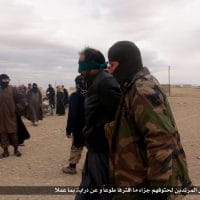-
Is a multipolar world the answer to U.S. imperialism?
Is there a growing resistance to the unipolar imperial order? Is the U.S. an empire in decline? Will the future be a multipolar one? If so, what does that mean ans how should the left in the imperialist core respond?
-
The U.S. armed and funded extremists in Syria
The US armed and funded extremists in Syria to overthrow the Syrian government and the media cheered. Those same extremists then attacked the Kurds on Turkey’s behalf to the horror of the same media. Now what?
-
The erasure of Syrian voices in Western media
“There were always two parallel streams in the Syrian uprising at the beginning. The civil activists who wanted democratic reform and change in the form of a secular state, and the conservative stream, which was markedly more Islamist and sectarian in its tone and demands.… the former was mostly urban, the latter rural.… As the uprising went on and the violence intensified, the civil movement became increasingly silenced and weak, while the Islamist movement became quickly more militant and radicalized”
-
The Much-Maligned Views of Rania Khalek on Syria
The people that have written about Rania [Khalek] publicly range from truly creepy stalkers to left academics who fired off a quick set of libels and then expressed dismay at the responses to them. But other than people talking about her, it is in fact rather difficult to find any sources for these “views” of hers that apparently disqualify her to speak or publish on any topic.
-
America’s love affair with Salafi jihadists
Contrary to popular media portrayals, the Middle East wasn’t always plagued by regressive fundamentalism. Salafi jihadist groups like Al Qaeda were not popular in the region. They still aren’t. They have been violently imposed on people thanks in large part to the actions of the US, which has a longstanding pattern of backing religious fundamentalists to further its geopolitical ambitions.





